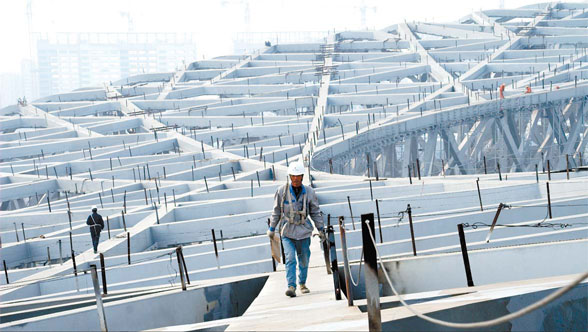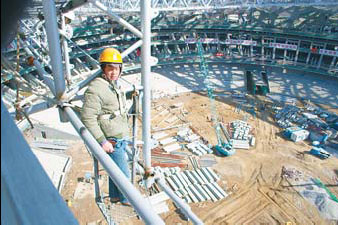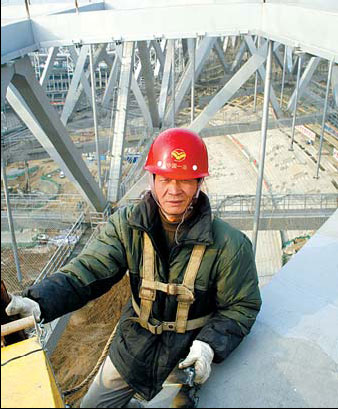Work, Nest and play
|
Contractor Shen, the chief of his team, does the check-up work. Photos by Li Ning and Zhu Yu |
Beijing Film Academy (BFA) student Li Ning made a sudden detour on his way to class, veering his car from the northern Fourth Ring Road and towards the steel framework of the "Bird's Nest". Li's companion and classmate, Zhu Yu, was hardly surprised by his impulse. After all, the emerging National Stadium lying on the capital's central axis had dominated both their lives for more than a year.
Bracing against a biting wind on this frigid winter's day, the pair of young filmmakers left their car and trudged toward the site, eager to catch up with the migrant workers they had come to know over these past months. "It may turn out to be a novel angle for filming if it's a rainy day," Li muses.
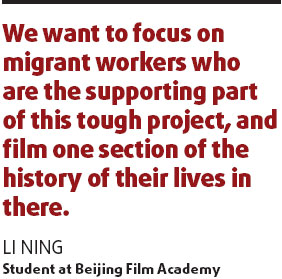
Li and Zhu, both third-year students at BFA's Photography College, have spent countless hours documenting construction of the Bird's Nest from vantage points such as the bridge located a few hundred meters away. From spring to winter last year, the pair appraised light and trained their viewfinder, capturing the human journeys behind the mammoth Olympic building project. They call these migrant workers "Nest raisers".
The students' initiative took seed in April 2006, with a large-scale photography contest, "Olympic Tower Raisers", organized by the Beijing Photographers' Association.
"We both jumped in and for the first time, got so close to the construction site of the stadium," says 22-year-old Zhu. "It really astonished me when it jumped into my eyes, and I was aware that an unusual experience had just begun."
"But in retrospect, our pictures were superficial. We were like visitors on a cursory sightseeing trip, picking up snaps instead of getting to the heart of subject."
Afterward, a different idea popped into Zhu's mind. She decided to track some of the builders at the Bird's Nest. Zhu wanted to experience their living conditions, and shoot an original and vivid documentary.
"We want to focus on migrant workers who are the supporting part of this tough project, and film one section of the history of their lives in there," 21-year-old Li says.
With the support of their parents, they soon owned the necessary photographic equipment and became regular callers at the stadium. They filmed the builders at work, and also went on excursions with the three central characters of their documentary, to record their leisure time at locations such as Tian'anmen Square or Qian Men.
The documentary follows three migrant workers from Liyang, Jiangsu province, a town known throughout the country for its steel and boiler production - known to the filmmakers as contractor Shen, welder Li Anming and electrician, old Di - gradually became better acquainted with the two visitors, and were willing to vent their feelings.
"This was of vital importance for the documentary," Li says.
|
A worker at the National Stadium. |
The workers' tasks require both physical strength and technique. Their risky work on the uppermost part of the stadium is reflected by their relatively high salaries. They can earn over 3,000 yuan ($412) a month, plus meals and accommodation.
Forty-year-old Shen is the chief of his team. He is a steady fellow, who has won the boss' trust. On most days, Shen takes along the blueprints of the stadium, weaving left and right through its steel frame to check up on work done earlier. The company has praised the top quality workmanship of Shen's skilled team, earning them the role of remedying problems arising during construction.
"The check-up work is not as easy as we imagined. Apart from technique, work safety is another concern," Li Ning says.
"Every single steel frame is no more than 1m and settled at a slightly oblique angle. The square just admits two men standing side by side. It is especially risky for the builders, who work girded to the intertwining frames by a short rope tied to one lower end of the frame."
Shen's son is another regular at the building site, though he is not on the payroll. But the foreman has little to do with his boy, who dropped out of school on account of low grades and discrimination from his peers. The boy came to Beijing with the hope of finding another school, but was thwarted by the 25,000 yuan annual tuition cost.
From time to time, Li and Zhu take the boy to visit Beijing's museums or Happy Valley amusement park. Li says he feels sorry for the dropout and has also given him books, hoping to enrich the boy's mind and his life.
Welder Li Anming is another skilled worker who carries great weight with his team. A former Liyang seafood seller with a tattoo of a powerful tiger on his back, Li is the breadwinner of his family of four.
Last year, he finally saved enough money to make his dream come true - to replace the dilapidated house he had first built in the 1980s. The two documentary makers visited Liyang in April to witness the tearing down of Li's old dwelling. The happy welder had built his new home by July.
"We were invited to see the new house as well," Zhu said. "And it really surprised us. The early ruins turned out to be a triplex villa with a pond that led onto the second floor via a 3m wide stairway."
|
Old Di, the electrician. |
But Li's wife worried about finance. The family had spent 20,000 yuan on the building, plus more on the interior, and found themselves in debt in order to complete the project.
"Well, Anming still oozed confidence for the future. He reserved a space for parking and planned to save money for buying a car," Li's wife says. "He is building the Bird's Nest that cost the government more than 3 billion yuan in Beijing. Equally, the new house upon which he has spent much labor and energy is almost done, so a slight overspending won't dampen his zeal."
The filmmakers have also great admiration for Old Di, the electrician. At 65, Di is the most experienced of the three central characters. His father, who passed away in 1982, worked for the underground Party before 1949. Born into a strong military atmosphere, Di put on the soldier's uniform when he was young and was later made bodyguard of a military commissar in Beijing.
Di subsequently worked as a patrolman on Chang'an Avenue and participated in disaster relief work following the 1976 earthquake at Tangshan, Hebei province. Di was discharged from the army at 37. In 1989, he became a migrant worker.
Zhu says: "Decades of hard life endowed him with a sense of calm and disengagement. Even now, a neat and trim appearance is what he always cares about, just as he did in the army."
The two filmmakers plan to revisit the Bird's Nest for the Lunar New Year as a finale to their work. Since late 2006, they have accumulated 2,500 minutes of footage, and shot more than 200 pictures. Their own Olympic dream has almost come to fruition.
Their project has attracted the attention of Beijing Photographers' Association deputy manager, Li Yingjie. "I often meet them at the site, and every time they are climbing up onto the top and walking in the mud. But their shots focus on the common worker all along, which is quite invaluable in today's society full of careerism," Li says.
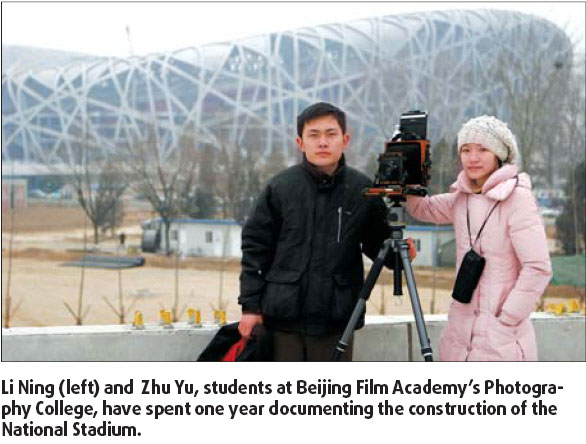
(China Daily 01/17/2008 page18)


